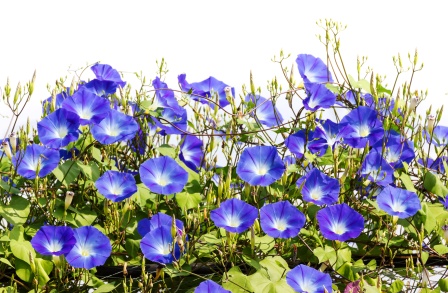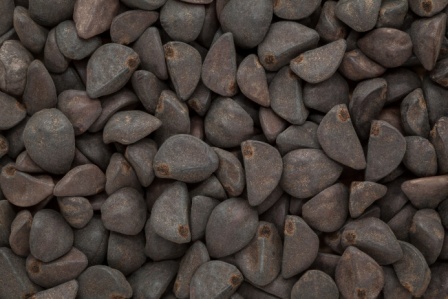Ipomoea hederacea Kaladana: Uses, Remedies, Research, Side Effects
Kaladana or Ipomoea hederacea is an Ayurvedic plant used for the treatment of of skin diseases, fever, headache, worm infestation and for inducing purgation. It is called Krishnabeeja in Ayurved.
Latin name- Ipomoea hederacea Jacq.
Family-Convolvulaceae

Table of Contents
Vernacular names
Names in different languages:
Hindi name- Kaladana
English name- Pharbitis seed, Morning Glory Flower
Arabic name- Habbunnel
Bengali name- Kala dana
Gujarathi name- Kala dana
Kannada name- Ganari beeja
Marathi name- Kala dana
Tamil name- Kakkatan
Telugu name- Kolli

Sanskrit Synonyms
Kala dana, Shyam beeja- The seeds are black in color
Kakanjani, Kakanjaika, Rechana, Shomabeeja.

Morphology
Morphology of Ipomoea hederacea:
Krishna beeja is a climbing vine which is hairy and soft. The leaf is heart shaped and hairy. The flowers are bluish to pink in color, funnel shaped. The fruits are egg shaped, occur in clusters of one to three and are 0.5 to 0.75 inch long 1 to 2 inch long and wide. The seeds are black in color, 4 to 6 in number, triangular in shape. The pulp inside the seed is white in color. The plant is found and grown all over the plains of India. The species is native to tropical parts of the America.
Properties, part used, dosage
Properties:
Rasa (Taste) – Katu (Pungent), Madhura (Sweet)
Guna (Qualities) – Laghu (Light for digestion), Ruksha (Dry in nature), Teekshna (Strong)
Veerya (Potency) – Ushna (Hot)
Vipaka – – Katu (Undergoes Pungent taste after digestion)
Karma (Actions) – Kaphapitta shamaka (reduces vitiated kapha and pitta dosha)

Part used- Seeds
Dosage- 1 to 3 g of seed powder
Chemical constituents
Chemical constituents of Ipomoea hederacea
The seed gave alkaloids lysergol, chanoclavine, penniclavine, iso-penni- clavine and elymoclavine. It also has glycoside and Aglacoside which can cause purgation.
Uses
Uses of Krishnabeeja:
- The seed of Ipomoea hederacea is applied over the area affected with skin diseases like ringworm and fungal infection.
- The powder of the seed is given in a dose of 2 to 3 g to cause purgation and is useful in severe constipation and in treating intestinal worm.
- The paste of the seed of Krishnabeeja is applied over the area affected with swelling, joints with pain.
- The paste of Ipomoea hederacea seed is applied over forehead to treat headache.
- The decoction of the seed is given in a dose of 40-50 ml to treat fever.
- The powder of the seed ( 1 to 2 g) with sugar candy, Haritaki fruit (Terminalia chebula) is given to treat hyperacidity.
रेचनं श्यामबीजं स्याच्छोमबीजं स्याच्छोथोदरविनाशनम्॥ ज्वरे पुरीषसङ्गे च दारुणे शिरसो गदे ।
उदावर्ते तथानाहे बुधैर्नाहे प्रयुज्यते॥ (आ.वि)

Adverse effects
Excessive use of Krishna beeja can cause purgation and abdominal cramps. Hence not advisable during diarrhea or related intestinal conditions.
Interaction with medicines, supplements
Can this be used while taking Homeopathic medicine?
Yes. This product does not react with homeopathic medicine.
Can
this medicine be continued while taking supplements like multivitamin tablets,
Omega 3 fatty acids etc?
Yes. Generally, this product goes well with most
of the dietary supplements. However, if you are taking more than one product
per day, please consult your doctor for an opinion.
With western
medicines
Seek your
doctor’s advice if you are taking this product along with other western
(allopathic / modern) medicines. Some Ayurvedic herbs can interact with modern
medicine.
If both Ayurvedic and allopathic medicines are advised together, then it is
best to take Allopathic medicine first, wait for 30 minutes and then take the
Ayurvedic medicine.
Formulation
Formulation containing Krishnabeeja:
Easigo tablet: This is a proprietary medicine used for the treatment of mild to severe constipation.
Research
Research articles related to Ipomoea hederacea:
Anti- microbial study: In the present study methanolic extracts of leaves, flowers, stem, seed and roots from Ipomoea hederacea were evaluated using an antimicrobial assay, the determination of total phenolic content, 2,2-diphenyl-1-picrylhydrazyl (DPPH) free radical and the total antioxidant capacity. Our results suggested that methanolic extracts exhibited high antimicrobial effects when tested against various bacterial and fungal strains (i.e. B. subtilis, P. multocida, S. aureus, E. coli, A. niger, A. flavus, A. alternate and R. solani).
Hepato- protective action: Ipomoea hederacea extract, a novel hepatoprotective drug has been shown to provide an antioxidant potential against carbon tetra chloride treated experimentally induced hepatotoxitic rats in comparison with standard hepatoprotective drug silymarin. Significantly raised levels of serum bilirubin, lipid peroxides and decreased activities of antioxidant enzymes such as superoxide dismutase, catalase, glutathione peroxidase, glutathione reductase and decreased activities of gamma glutamyl transpeptidase were observed and it was nearer to normal in Ipomoea hederacea administrated experimentally induced hepatotoxic rats. These observations clearly suggested the hepato- protectivity and antioxidant property of Ipomoea hederacea.
Scientific classification
Kingdom: Plantae
Order: Solanales
Family: Convolvulaceae
Genus: Ipomoea
Species: I. hederacea
Author:
Dr.B.K.Prashanth M.D (Ayu), Ph.D
E mail: drprashanthbk@gmail.com










